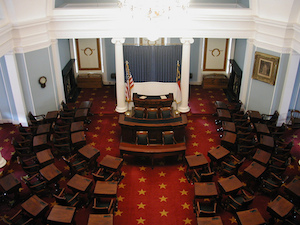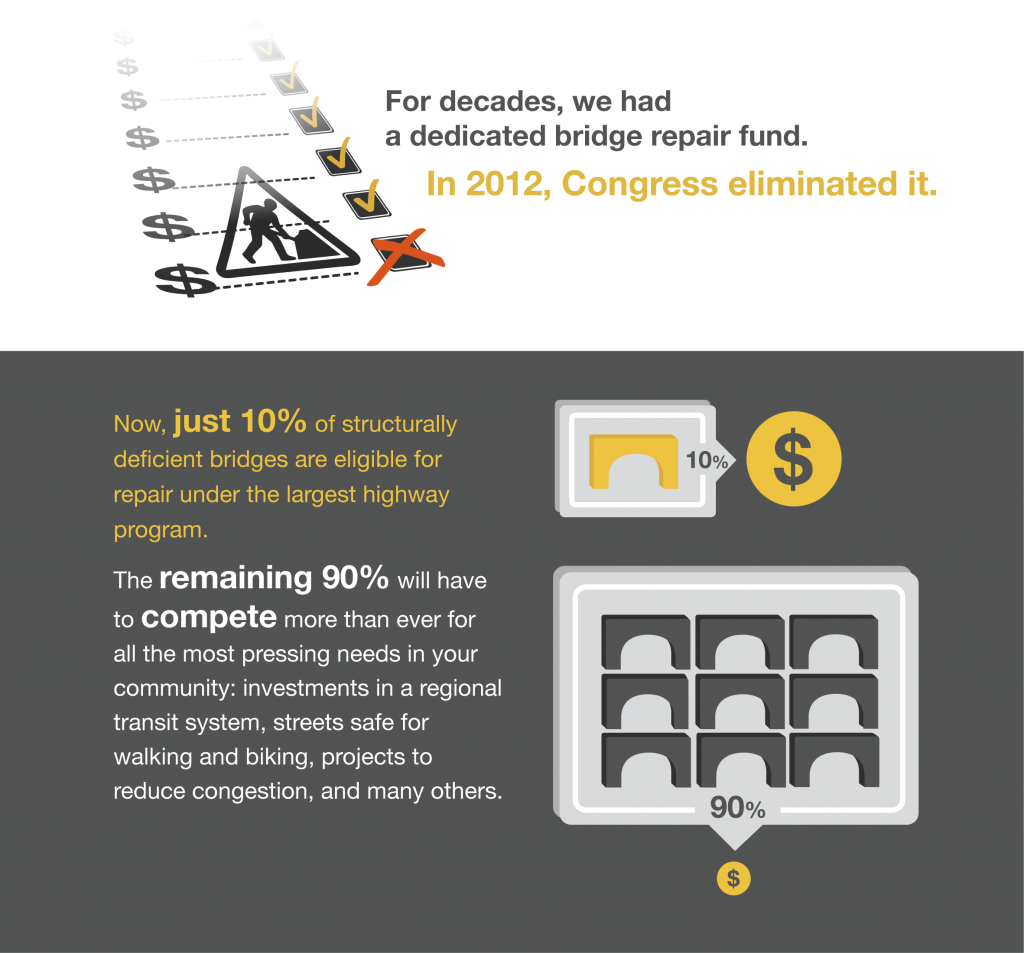
The annual transportation (and housing) appropriations bill adopted Thursday by Senate appropriators contains some good news for transportation. But as in years past, it provides more money than the House’s version, setting the stage for contentious negotiations that could erase gains for key programs — especially competitive grants and new transit construction. Senate appropriators also noted that if the trust fund goes bankrupt, as it is projected to do as soon as next month, there won’t be any money to appropriate.
Senate Appropriations Chairman Patty Murray (D-WA) wasted no time noting that elephant in the room during yesterday’s proceedings.
“To deal with the uncertainty [of the highway trust fund], states are already bracing for a worst case scenario and some states like Arkansas are already putting projects on hold,” she said. (We also noted, the same fact about Arkansas that we called out in our recent report on the impacts of trust fund insolvency.)
“This crisis could hurt workers in the construction industry who depend on jobs repairing our roads and bridges, and if Congress does not act, a shortfall in the highway trust fund will put at risk the funding we have put forth in the THUD bill.”
Because the appropriators in the House and Senate aren’t responsible for finding a revenue solution – that rests with the Senate Finance and House Ways and Means Committees – they have to go ahead and set funding levels for this year expecting the looming crisis does not unfold. The senators showed confidence that their colleagues in the finance committees will, at minimum, find a short-term fix to keep the trust fund solvent.
“Because we had a reasonable allocation, we were able to avoid the painful cuts the House bill would make to housing programs, transit, and Amtrak, as well as TIGER,” said Senator Murray.
Not only does the Senate provide slightly more overall funding for transportation for the next fiscal year (FY15 begins this October), their funding level stands in contrast to the House’s version in a few key areas. (See full funding chart below.)
“Our bill continues to support the TIGER program, an effective initiative that helps to advance transportation infrastructure projects,” said Senator Susan Collins (R-ME), ranking member of the Senate Appropriations transportation subcommittee. The Senate bill which provides $550 million for another round of TIGER discretionary grants, including up to $35 million for TIGER transportation planning activities which Transportation for America and our coalition of elected, chambers of commerce and businesses support.
“I know that a lot of us have seen how the TIGER projects create jobs and support economic growth in our home states and I wish we could have funded it at a higher level,” she added. The TIGER program is wildly popular and scores of Republicans and Democrats alike have written numerous letters to USDOT supporting various applications in their districts.
“Once again, we’re encouraged to see the commitment to provide reliable funding for transportation each year from the appropriators in the Senate, and especially the leadership from Chairwoman Murray to ensure that we continue funding transformative programs like TIGER and new transit construction,” said T4 America Chair John Robert Smith. “Our cities and towns and metro areas are facing huge challenges of connecting people to jobs and vice versa, and ensuring that we fund a range of transportation options and innovative locally-driven projects that will help these places address those challenges head-on.”
Senator Mikulski noted that Senate leadership is “in conversation to bring a clustered appropriations bill to the floor during the week of June 16,” and after that the House and the Senate will attempt to reconcile these two bills. The largest stumbling block may be the that the Senate has $2.4 billion (4.6 percent) more in total discretionary spending than their House counterparts. Time will tell, but we are encouraged by the Senate’s approach and leadership shown by Senators Murray and Collins.
| FY14 USDOT actual | GROW AMERICA Act for FY15 (President's 4-year proposal) | HOUSE FY15 THUD Proposal ( & difference vs FY14 actual) | SENATE FY15 THUD Proposal (& difference vs FY14 actual) | DIFFERENCE between House & Senate FY15 proposals | |
|---|---|---|---|---|---|
| Federal-Aid Highways | $40.26B | $48.062B | $40.26B | $40.3B (+$40M than FY14) | +$40M in Senate proposal |
| Transit Formula Grants | $8.6B | $13.914B | $8.6B | $8.6B | - |
| Transit 'New & 'Small Starts' | $1.943B | $2.5B | $1.691B (-$252M than FY14) | $2.163B (+$220M than FY14) | +$472M in Senate proposal |
| TIGER | $600M | $1.25B | $100M (-$500M than FY14) | $550M -($50M than FY14) | +$450M in Senate proposal |
| Amtrak Operating | $340M | Proposes to roll passenger rail into two new programs that total $4.775 billion* | $340M | $340M | - |
| Amtrak Capital | $1.05B | same as above | $850M (-$200M than FY14) | $1.04B (-$10M than FY14) | +$190M in Senate proposal |
| High speed rail | $0 | same as above | $0 | $0 | - |
*Up to $35 million is available for planning activities in the Senate FY15 THUD proposal.
**The FY15 Administration Budget (Grow America Act) consolidates existing rail programs into 2 new programs (Rail Service Improvement Program and Current Passenger Rail Service).




